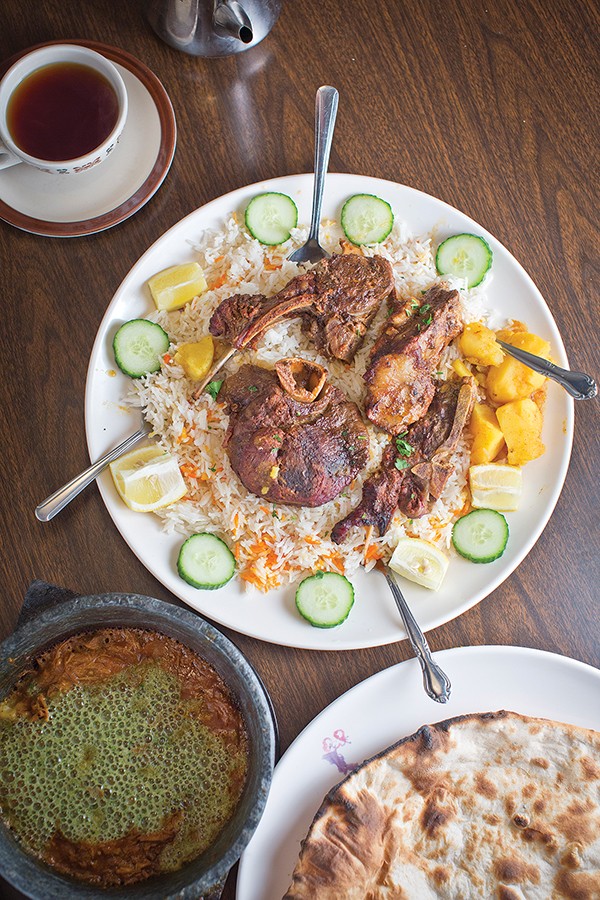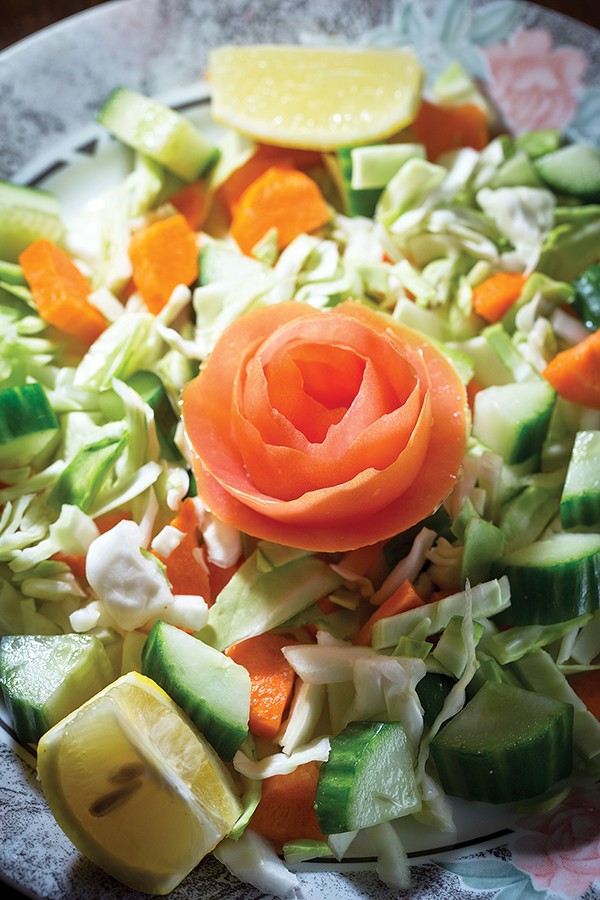César González is offering something broad yet very specific through his new restaurant endeavor Sabor Caribe.
Translated, Sabor Caribe means Caribbean flavors, and being from Venezuela, González knows the specialty well. He knows Venezuelan flavors and Cuban flavors and Colombian flavors and Dominican Republic and Puerto Rican, and he can point to any number of items on his new menu that are particular to these areas.
Take his patacones ($9), sandwiches that substitute fried plantains for bread and are filled with chicken, beef, or pork and dressed with coleslaw and a special homemade sauce. He brought that with him from Venezuela and the Dominican Republic.
“Memphis doesn’t have anything with this specific cuisine,” González says. “There’s a Cuban restaurant, but nobody in town is doing Venezuelan and Colombian and Cuban together.”
His cachapas ($10) made the journey from Colombia and are presented as cornmeal pancakes filled with beef, chicken, pork, or white cheese.
The quesillo dessert ($2.50) came straight out of his grandmother’s kitchen. Similar to Mexican flan, the egg and sweet-milk dish is cooked for three hours al baño de María, a double-pan cooking method.
González is not new to the restaurant world. He has two restaurants in Venezuela, one a bakery/deli, and a year ago he kicked off two food trucks by the same name, Sabor Caribe.
“The restaurant is different from the food trucks. I don’t have the specific grill I need for some of the dishes in my food trucks, so they don’t have all the entrees or the sandwiches,” he says.
González got the idea for a restaurant in his new hometown — he’s been in Memphis for more than seven years — after he received a phone call from the Polanias, who owned Arepa and Salsa.
“I’m friends with the owners of Arepa and Salsa, and when they decided to leave, he called me and asked me if I wanted to take the location,” González says. “I thought it was a good idea.”
He’s changed up the interior a bit, adding new booths, painting, adding a gallery wall which will lead into a new bar on the west side of the building where, once open and he has his beer and liquor license, he plans on having Caribbean music and a place to watch boxing matches or football (the Caribbean kind) on the big screen.
“I love this area. They’ve been very welcoming, and it’s very diverse. That’s the reason I wanted to be here,” he says.
And yes, there are arepas, lots of arepas.
Sabor Caribe is open Monday through Thursday, 11 a.m. to 9 p.m., and Friday through Saturday, 11 a.m. to 11 p.m.
The name Sheba is synonymous with mystery and power. She is thought to be the queen of Ethiopia, the mother of King Solomon’s son, Menelik, and associated with the possession of the Ark of the Covenant.
Under her rulership fell the region of Shaba, which is now known as Yemen.
When Yemeni gas station entrepreneur Kallead Isa was approached about opening a restaurant in Memphis, the name for it came easy to him.
“She controlled the whole region,” Isa says. “People know, when you see her name it refers back to the Middle East, especially Ethiopia and Yemen.”
On February 1st, Isa opened Queen of Sheba, his first restaurant and the only one of its kind in the Mid-South.
Located in the old Edo Japanese Restaurant at 4792 Summer, Queen of Sheba specializes in Yemeni cuisine, something Isa found lacking in Memphis.
“A lot of Yemenis and people in the Arabic community were asking about Middle Eastern food, particularly Yemeni food. You can’t find it anywhere,” Isa says.
 Justin Fox Burks
Justin Fox Burks
lamb haneeth
Inside the doors of the site between Charlie’s Meat Market and the Jerusalem Market and Restaurant, Yemeni food devotees can find lamb haneeth ($15.99/$10.99), seasoned lamb; saltah ($7.99), a stew featuring cooked vegetables, topped with helbeh, or whipped fenugreek, and considered the national dish of Yemen; fahsah ($9.99), similar to saltah but with shredded beef, served with handmade, fresh-baked flatbread.
 Justin Fox Burks
Justin Fox Burks
“You have to eat the saltah when it’s hot, like a volcano,” Saleh Nasher, one of the cooks, says.
A peek inside the kitchen finds a goat’s head and a tandoor oven, a traditional Middle Eastern oven that insulates and concentrates heat inside a cylindrical container.
Hummus ($4.99), black tea with cardamom and clove, and ma’soob ($9.99), or bananas and ground flatbread with cream, nuts, honey, and raisins, it’s all there.
As of now, Isa and team are still working on the interior. They plan on leaving the booths familiar to Edo regulars but adding decor including images depicting Sheba as well as Yemeni architecture and other regional references.
Isa’s idea also came from a phone call.
“A friend of mine gave me the phone number of the previous owners (of Edo), and I came by and talked to them, and they told me that if I have an idea to do something different, I could have this place,” Isa says.
Queen of Sheba is open daily from 9 a.m. to 9 p.m.